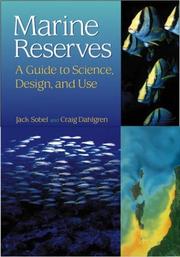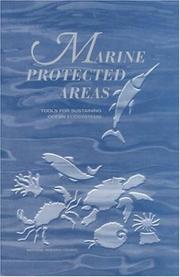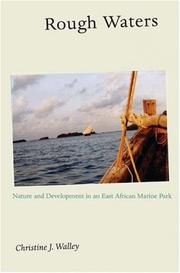| Listing 1 - 10 of 12 | << page >> |
Sort by
|
Book
ISBN: 0081026994 0081026986 9780081026991 9780081026984 Year: 2020 Publisher: Amsterdam, Netherlands ; Oxford, England ; Cambridge, Massachusetts : Elsevier,
Abstract | Keywords | Export | Availability | Bookmark
 Loading...
Loading...Choose an application
- Reference Manager
- EndNote
- RefWorks (Direct export to RefWorks)

ISBN: 1597262536 1597268992 1423765532 9781597268998 9781423765530 9781597262538 1559638400 9781559638401 1559638419 9781559638418 1559635207 Year: 2004 Publisher: Washington, D.C. Island Press
Abstract | Keywords | Export | Availability | Bookmark
 Loading...
Loading...Choose an application
- Reference Manager
- EndNote
- RefWorks (Direct export to RefWorks)
Book
ISBN: 9781139049382 9780521766050 9780521141086 9781139159166 113915916X 1283341069 9781283341066 9781139161213 1139161210 1139049380 9781139157391 1139157396 0521766052 0521141087 1107224985 9781107224988 1139152726 9781139152723 1139160214 9781139160216 9786613341068 6613341061 1139155644 9781139155649 Year: 2011 Publisher: Cambridge : Cambridge University Press,
Abstract | Keywords | Export | Availability | Bookmark
 Loading...
Loading...Choose an application
- Reference Manager
- EndNote
- RefWorks (Direct export to RefWorks)
Human-induced environmental disturbance - through fishery activities, coastal development, tourism and pollution - is a major challenge to the restoration and conservation of marine biodiversity. Synthesizing the latest research into marine biodiversity conservation and fisheries management, this book provides regional and global perspectives on the role of Marine Protected Areas (MPAs) in confronting this challenge. The approach is multidisciplinary, covering all the fields involved in designating and assessing MPAs: ecology, fisheries science, statistics, economics, sociology and genetics. The book is structured around key topics, including threats to marine ecosystems and resources, the effects and effectiveness of MPAs and the scaling-up of MPA systems. Both theoretical and empirical approaches are considered. Recognizing the diversity of MPA sciences, the book also includes one part designed specifically as a practical guide to implementing scientific assessment studies of MPAs and monitoring programs.

ISBN: 0309072867 0309511690 9780309511698 9780309072861 9780309072861 0305072867 030917144X Year: 2001 Publisher: Washington, D.C. National Academy Press
Abstract | Keywords | Export | Availability | Bookmark
 Loading...
Loading...Choose an application
- Reference Manager
- EndNote
- RefWorks (Direct export to RefWorks)
Marine parks and reserves. --- Earth & Environmental Sciences --- Marine Science --- Conservation areas, Marine --- Marine conservation areas --- Marine protected areas --- Marine reserves --- Marine sanctuaries --- MPAs (Marine protected areas) --- Sanctuaries, Marine --- Aquatic parks and reserves
Book
ISSN: 20707010 ISBN: 9251075077 9789251075074 9789251075067 9251075069 Year: 2013 Volume: 556/2 Publisher: Rome
Abstract | Keywords | Export | Availability | Bookmark
 Loading...
Loading...Choose an application
- Reference Manager
- EndNote
- RefWorks (Direct export to RefWorks)
This Fisheries and Aquaculture Technical Paper presents case studies of the policy, governance and institutional issues of marine protected areas (MPAs) in Japan, Mauritania, the Philippines and Samoa. It is the second of four in a global series of case studies on MPAs. An initial volume provides an analysis and synthesis of all the studies. The set of global MPA case studies was designed to close a deficit in information on the governance of MPAs and spatial management tools, within both fisheries management and biodiversity conservation contexts. The studies examine governance opportunities in and constraints on the use of spatial management measures at the national level. They were also designed to inform implementation of the FAO Technical Guidelines on Marine protected areas (MPAs) and fisheries, which were developed to provide information and guidance on the use of MPAs in the context of fisheries.--

ISBN: 1282704613 9786612704611 9882201865 9789882201866 9622093884 9789622093881 Year: 1995 Publisher: Hong Kong Hong Kong University Press
Abstract | Keywords | Export | Availability | Bookmark
 Loading...
Loading...Choose an application
- Reference Manager
- EndNote
- RefWorks (Direct export to RefWorks)
The shores of Hong Kong are geologically diverse and have been shaped by wind, rain and sea to produce a wide array of seascapes, from towering cliffs in the southeast and on many wave-battered islands, to wide expanses of mud in the northwest. Fringed by tropical mangroves, such mudflats are home to the secretive denizens of water-logged bunows and are patrolled by vast flocks of wading birds that arcive in Hong Kong each spring and autumn to exploit its resident productivity. The Mai Po Marshes Nature Reserve is such a protected habitat and seascape. Most (80%) of Hong Kong's shores are, however, of rock and wave and have not generated the same interest and support for their continued survival. Survival is, however, becoming increasingly important because even the outermost reaches of Hong Kong's tentorial waters are now under the pervasive threat of pollution. No piece of coast in Hong Kong has escaped the attentions of inshore fishermen, who collect a great arcay of marine life for consumption. Urban settlements are spreading out from the city centres and, along with other coastal developments such as the new port and airport, refuse tips, power stations and docks and jetties, there are the insidious effects of the vast quantities of urban sewage, agricultural effluents, industrial contaminants and construction wastes that this city generates and disperses into its sureounding sea, often at the shoreline.

ISBN: 1282531697 9786612531699 1400835755 9781400835751 0691115591 0691115605 9780691115597 0691115591 9780691115603 0691115605 9781282531697 661253169X Year: 2004 Publisher: Princeton Princeton University Press
Abstract | Keywords | Export | Availability | Bookmark
 Loading...
Loading...Choose an application
- Reference Manager
- EndNote
- RefWorks (Direct export to RefWorks)
Rough Waters explores one of the most crucial problems of the contemporary era--struggles over access to, and use of, the environment. It combines insights from anthropology, history, and environmental studies, mounting an interdisciplinary challenge to contemporary accounts of "globalization." The book focuses on The Mafia Island Marine Park, a national park in Tanzania that became the center of political conflict during its creation in the mid-1990s. The park, reflecting a new generation of internationally sponsored projects, was designed to encourage environmental conservation as well as development. Rather than excluding residents, as had been common in East Africa's mainland wildlife parks, Mafia Island was intended to represent a new type of national park that would encourage the participation of area residents and incorporate their ideas. While the park had been described in the project's general management plan as "for the people and by the people," residents remained excluded from the most basic decisions made about the park. The book details the day-to-day tensions and alliances that arose among Mafia residents, Tanzanian government officials, and representatives of international organizations, as each group attempted to control and define the park. Walley's analysis argues that a technocentric approach to conservation and development can work to the detriment of both poorer people and the environment. It further suggests that the concept of the global may be inadequate for understanding this and other social dramas in the contemporary world.
Economic development projects --- Marine parks and reserves --- Conservation areas, Marine --- Marine conservation areas --- Marine protected areas --- Marine reserves --- Marine sanctuaries --- MPAs (Marine protected areas) --- Sanctuaries, Marine --- Aquatic parks and reserves --- Development projects, Economic --- Projects, Economic development --- Economic assistance --- Technical assistance --- Social aspects. --- Mafia Island Marine Park (Tanzania) --- Social aspects
Book
ISBN: 1281036099 9786611036096 0080551033 9780080551036 9781281036094 9780120444557 1570594236 9781570594236 0120444550 Year: 1997 Publisher: San Diego, Calif., U.S.A. Austin Academic Press R.G. Landes
Abstract | Keywords | Export | Availability | Bookmark
 Loading...
Loading...Choose an application
- Reference Manager
- EndNote
- RefWorks (Direct export to RefWorks)
This book reviews the need for marine conservation, summarizes general measures for ocean and coastal conservation, and explains the rationale for establishing marine protected areas. The second half of the book is essentially a guideline for designing and implementing protected areas in order to make them viable and long-lasting in their effectiveness.
Marine parks and reserves. --- Marine resources conservation. --- Marine biodiversity conservation. --- Conservation of marine biodiversity --- Marine biodiversity --- Marine biological diversity conservation --- Aquatic biodiversity conservation --- Marine resources conservation --- Conservation of marine resources --- Marine conservation --- Marine environmental protection --- Marine protection --- Aquatic resources conservation --- Marine pollution --- Conservation areas, Marine --- Marine conservation areas --- Marine protected areas --- Marine reserves --- Marine sanctuaries --- MPAs (Marine protected areas) --- Sanctuaries, Marine --- Aquatic parks and reserves --- Conservation --- Biological diversity conservation.
Book
ISBN: 9783319109572 3319109561 9783319109565 331910957X Year: 2015 Publisher: Cham : Springer International Publishing : Imprint: Springer,
Abstract | Keywords | Export | Availability | Bookmark
 Loading...
Loading...Choose an application
- Reference Manager
- EndNote
- RefWorks (Direct export to RefWorks)
This book is a critical analysis of the concept of marine protected areas (MPAs) particularly as a tool for marine resource management. It explains the reasons for the extraordinary rise of MPAs to the top of the political agenda for marine policy, and evaluates the scientific credentials for the unprecedented popularity of this management option. The book reveals the role played by two policy networks – epistemic community and advocacy coalition – in promoting the notion of MPA, showing how advocacy for marine reserves by some scientists based on limited evidence of fisheries benefits has led to a blurring of the boundary between science and politics. Second, the study investigates whether the scientific consensus on MPAs has resulted in a publication bias, whereby pro-MPA articles are given preferential treatment by peer-reviewed academic journals, though it found only limited evidence of such a bias. Third, the project conducts a systematic review of the literature to determine the ecological effects of MPAs, and reaches the conclusion that there is little proof of a positive impact on finfish populations in temperate waters. Fourth, the study uses discourse analysis to trace the effects of a public campaigning policy network on marine conservation zones (MCZs) in England, which demonstrated that there was considerable confusion over the objectives that MCZs were being designated to achieve. The book’s conclusion is that the MPA issue shows the power of ideas in marine governance, but offers a caution that scientists who cross the line between science and politics risk exaggerating the benefits of MPAs by glossing over uncertainties in the data, which may antagonise the fishing industry, delay resolution of the MPA issue, and weaken public faith in marine science if and when the benefits of MCZs are subsequently seen to be limited.
Environment. --- Environmental Management. --- Environmental Law/Policy/Ecojustice. --- Freshwater & Marine Ecology. --- Nature Conservation. --- Environmental sciences. --- Aquatic biology. --- Environmental law. --- Environmental management. --- Sciences de l'environnement --- Hydrobiologie --- Environnement --- Droit --- Gestion --- Earth & Environmental Sciences --- Environmental Sciences --- Marine parks and reserves --- Conservation areas, Marine --- Marine conservation areas --- Marine protected areas --- Marine reserves --- Marine sanctuaries --- MPAs (Marine protected areas) --- Sanctuaries, Marine --- Aquatic ecology. --- Environmental policy. --- Nature conservation. --- Aquatic parks and reserves --- Conservation of nature --- Nature --- Nature protection --- Protection of nature --- Conservation of natural resources --- Applied ecology --- Conservation biology --- Endangered ecosystems --- Natural areas --- Hydrobiology --- Water biology --- Aquatic sciences --- Biology --- Environment law --- Environmental control --- Environmental protection --- Environmental quality --- Environmental policy --- Law --- Sustainable development --- Environmental stewardship --- Stewardship, Environmental --- Environmental sciences --- Management --- Conservation --- Law and legislation --- Aquatic ecology . --- Aquatic biology --- Ecology --- Environment and state --- Environmental management --- State and environment --- Environmental auditing --- Government policy
Book

ISBN: 270992093X 2709920921 Year: 2016 Publisher: Marseille : IRD Éditions,
Abstract | Keywords | Export | Availability | Bookmark
 Loading...
Loading...Choose an application
- Reference Manager
- EndNote
- RefWorks (Direct export to RefWorks)
Les écosystèmes côtiers, qui concentrent actuellement 70 % de la population mondiale, sont particulièrement impactés par le changement climatique et les activités anthropiques. D’où les espoirs placés dans la création d’aires marines protégées (AMP), qui favorisent la résilience des systèmes vivants et la conservation des espèces. Au cours des dernières années, un véritable consensus international s’est progressivement imposé quant à l’intérêt de les multiplier. Cependant, de nombreuses incertitudes demeurent sur leur efficacité réelle et sur les modalités de leur mise en œuvre. Les enjeux sociétaux qui sont associés à la multiplication des AMP interrogent les scientifiques, notamment en termes d’acceptation sociale, de régulation juridique et de pérennité des dispositifs mis en place. Ainsi, entre soutien au développement des AMP et analyse des controverses dont elles font parfois l’objet, cet ouvrage apporte un éclairage interdisciplinaire sur le développement de ces nouveaux espaces de conservation. Les études présentées ici sont centrées sur l’Afrique du Nord-Ouest (Algérie, Maroc et Sénégal). À travers le regard de juristes, d’écologues, de géographes, d’économistes, elles illustrent le potentiel associé à ce mode de conservation des zones marines et côtières. Elles questionnent par ailleurs l’efficience des AMP, tout en soulignant leur intérêt, bien au-delà des territoires où elles se situent.
Marine ecology --- Coastal ecology --- Marine resources conservation --- Marine parks and reserves --- Biodiversity conservation --- Fishing --- Water resources development --- Environmental aspects --- Energy development --- Natural resources --- Water-supply --- Angling --- Recreational fishing --- Sport fishing --- Sportfishing --- Aquatic sports --- Wildlife-related recreation --- Fishes --- Biodiversity --- Biological diversity conservation --- Conservation of biodiversity --- Diversity conservation, Biological --- Gender mainstreaming in biodiversity conservation --- Maintenance of biological diversity --- Preservation of biological diversity --- Conservation of natural resources --- Ecosystem management --- Conservation areas, Marine --- Marine conservation areas --- Marine protected areas --- Marine reserves --- Marine sanctuaries --- MPAs (Marine protected areas) --- Sanctuaries, Marine --- Aquatic parks and reserves --- Conservation of marine resources --- Marine conservation --- Marine environmental protection --- Marine protection --- Aquatic resources conservation --- Marine pollution --- Coast ecology --- Coastal zone ecology --- Coasts --- Coastal biology --- Ecology --- Sublittoral ecology --- Biological oceanography --- Marine ecosystems --- Ocean --- Aquatic ecology --- Conservation --- pêche --- écosystème --- conservation --- ressource halieutique --- Afrique occidentale
| Listing 1 - 10 of 12 | << page >> |
Sort by
|

 Search
Search Feedback
Feedback About UniCat
About UniCat  Help
Help News
News